- Essay Editor

Mental Health Essay

Introduction
Mental health, often overshadowed by its physical counterpart, is an intricate and essential aspect of human existence. It envelops our emotions, psychological state, and social well-being, shaping our thoughts, behaviors, and interactions. With the complexities of modern life—constant connectivity, societal pressures, personal expectations, and the frenzied pace of technological advancements—mental well-being has become increasingly paramount. Historically, conversations around this topic have been hushed, shrouded in stigma and misunderstanding. However, as the curtains of misconception slowly lift, we find ourselves in an era where discussions about mental health are not only welcomed but are also seen as vital. Recognizing and addressing the nuances of our mental state is not merely about managing disorders; it's about understanding the essence of who we are, how we process the world around us, and how we navigate the myriad challenges thrown our way. This essay aims to delve deep into the realm of mental health, shedding light on its importance, the potential consequences of neglect, and the spectrum of mental disorders that many face in silence.
Importance of Mental Health
Mental health plays a pivotal role in determining how individuals think, feel, and act. It influences our decision-making processes, stress management techniques, interpersonal relationships, and even our physical health. A well-tuned mental state boosts productivity, creativity, and the intrinsic sense of self-worth, laying the groundwork for a fulfilling life.
Negative Impact of Mental Health
Neglecting mental health, on the other hand, can lead to severe consequences. Reduced productivity, strained relationships, substance abuse, physical health issues like heart diseases, and even reduced life expectancy are just some of the repercussions of poor mental health. It not only affects the individual in question but also has a ripple effect on their community, workplace, and family.
Mental Disorders: Types and Prevalence
Mental disorders are varied and can range from anxiety and mood disorders like depression and bipolar disorder to more severe conditions such as schizophrenia.
- Depression: Characterized by persistent sadness, lack of interest in activities, and fatigue.
- Anxiety Disorders: Encompass conditions like generalized anxiety disorder, panic attacks, and specific phobias.
- Schizophrenia: A complex disorder affecting a person's ability to think, feel, and behave clearly.
The prevalence of these disorders has been on the rise, underscoring the need for comprehensive mental health initiatives and awareness campaigns.
Understanding Mental Health and Its Importance
Mental health is not merely the absence of disorders but encompasses emotional, psychological, and social well-being. Recognizing the signs of deteriorating mental health, like prolonged sadness, extreme mood fluctuations, or social withdrawal, is crucial. Understanding stems from awareness and education. Societal stigmas surrounding mental health have often deterred individuals from seeking help. Breaking these barriers, fostering open conversations, and ensuring access to mental health care are imperative steps.
Conclusion: Mental Health
Mental health, undeniably, is as significant as physical health, if not more. In an era where the stressors are myriad, from societal pressures to personal challenges, mental resilience and well-being are essential. Investing time and resources into mental health initiatives, and more importantly, nurturing a society that understands, respects, and prioritizes mental health is the need of the hour.
- World Leaders: Several influential personalities, from celebrities to sports stars, have openly discussed their mental health challenges, shedding light on the universality of these issues and the importance of addressing them.
- Workplaces: Progressive organizations are now incorporating mental health programs, recognizing the tangible benefits of a mentally healthy workforce, from increased productivity to enhanced creativity.
- Educational Institutions: Schools and colleges, witnessing the effects of stress and other mental health issues on students, are increasingly integrating counseling services and mental health education in their curriculum.
In weaving through the intricate tapestry of mental health, it becomes evident that it's an area that requires collective attention, understanding, and action.
Short Essay about Mental Health
Mental health, an integral facet of human well-being, shapes our emotions, decisions, and daily interactions. Just as one would care for a sprained ankle or a fever, our minds too require attention and nurture. In today's bustling world, mental well-being is often put on the back burner, overshadowed by the immediate demands of life. Yet, its impact is pervasive, influencing our productivity, relationships, and overall quality of life.
Sadly, mental health issues have long been stigmatized, seen as a sign of weakness or dismissed as mere mood swings. However, they are as real and significant as any physical ailment. From anxiety to depression, these disorders have touched countless lives, often in silence due to societal taboos.
But change is on the horizon. As awareness grows, conversations are shifting from hushed whispers to open discussions, fostering understanding and support. Institutions, workplaces, and communities are increasingly acknowledging the importance of mental health, implementing programs, and offering resources.
In conclusion, mental health is not a peripheral concern but a central one, crucial to our holistic well-being. It's high time we prioritize it, eliminating stigma and fostering an environment where everyone feels supported in their mental health journey.
Frequently Asked Questions
- What is the primary focus of a mental health essay?
Answer: The primary focus of a mental health essay is to delve into the intricacies of mental well-being, its significance in our daily lives, the various challenges people face, and the broader societal implications. It aims to shed light on both the psychological and emotional aspects of mental health, often emphasizing the importance of understanding, empathy, and proactive care.
- How can writing an essay on mental health help raise awareness about its importance?
Answer: Writing an essay on mental health can effectively articulate the nuances and complexities of the topic, making it more accessible to a wider audience. By presenting facts, personal anecdotes, and research, the essay can demystify misconceptions, highlight the prevalence of mental health issues, and underscore the need for destigmatizing discussions around it. An impactful essay can ignite conversations, inspire action, and contribute to a more informed and empathetic society.
- What are some common topics covered in a mental health essay?
Answer: Common topics in a mental health essay might include the definition and importance of mental health, the connection between mental and physical well-being, various mental disorders and their symptoms, societal stigmas and misconceptions, the impact of modern life on mental health, and the significance of therapy and counseling. It may also delve into personal experiences, case studies, and the broader societal implications of neglecting mental health.
Related articles
Top 10 excuses for not doing homework: how to trick your teacher in 2024.
Whether it’s because you’re buried in other commitments or just had a seriously off day, finding credible excuses for not doing homework can save your day. Here's a brief look at the top 10 homework excuses, with tips on making them sound as true as possible. Just remember, use these wisely and try to stay on top of your assignments! 1. “My computer crashed right before I finished” In today’s digital world, technology problems are a plausible justification. Claiming that your laptop glitched ...
Top 5 Creative Book Report Ideas That Guarantee Success in Class
Assigned reading helps students develop their critical analysis skill, and book reports test their progress. But it is not enough to simply analyze a literary work — you also need to express your creativity while presenting book report ideas. In this article, you will learn the definition of a literary report, its purpose, and five alternative book report ideas to show off your creativity in class. What is a book (literary) report? A book report is an overall summary and personal assessment o ...
Discussion Posts: Definition, Overview, Writing Tips
Discussions are an important part of academic studies. They foster collaboration, raise student engagement, and help to better process new information. A common way to involve students in critical debate is through discussion posts. In this article, you will learn what a discussion post is and how to write it. Discussion post and open forum definition A discussion post is a written reply typically used in online forums – websites that encourage users to engage in a debate over various subject ...
How to Write a Table of Contents for Research Paper: A Complete Guide
After hundreds of hours of non-stop working, the research essay is finished! Unfortunately, it is not the time to celebrate. That’s when you must get down to one of the least pleasant things in professional college or high school writing – a table of contents. The following article will define table of contents, discuss its purpose, and provide guidance on how to make a table of contents for a research paper. What is a research paper table of contents? Academic essays can be from 2–3 to hundr ...
Why Homework Is Good for Students: 20 No-Nonsense Reasons
Is homework beneficial in education? It has long been a cornerstone, often sparking debates about its value. Some argue it creates unnecessary stress, while others assert it’s essential for reinforcing in-class learning. Why is homework important? The reality is, that homework is vital for students' personal and academic growth. It not only improves their grasp of the material but also develops crucial skills that extend well beyond the classroom. This review explores 20 reasons why homework is ...
Top Proven Tips on How to Make Homework Fun
Everyone agrees that school would be much cooler if there were no homework. Alas, this is an impossible wish. Luckily, no one stops us from making it fun! In this article, you will find some awesome tips on how to make homework fun. 1. Create a comfortable study space Having a separate place where you can study is very important. Sure, you might think sitting on a couch with a laptop in your lap is as fun as it can get, but in reality, it may hinder your progress. Your brain knows that the co ...
How to Write a History Essay: A Guideline for Non-Historians
History is a difficult discipline, no one can argue with that. It is especially challenging to write a history essay when you have zero historian bone in your body. That’s why today our goal is to teach you how to write a history essay. What is history essay? A historical paper is a classic instance of a scholarly work that seeks to examine and give answers to questions about long-gone factual incidents and their consequences. Unlike a simple narrative or description, a history paper demands ...
Best Places to Do Homework That Will Create a Perfect Study Heaven for You
Are you wondering, ‘Where can I go to do homework?’ Finding the ideal spot for studying can significantly affect your productivity and overall study experience. Whether you're a student seeking solace or someone looking for a change of scenery, selecting the right environment is key to maximizing your efficiency and focus. In this guide, we’ll discover various places to do homework that can transform your study routine into a more engaging and effective experience. The Importance of Having a C ...

20 Ways to Protect Your Mental Health
Here’s what science shows can help keep us on track..
Posted January 1, 2020 | Reviewed by Lybi Ma

We’ve crossed the threshold into a new decade. There’s a lot of resolution advice swirling, but not all of it is evidence-based or realistic.
The World Health Organization (WHO) has declared a global mental health crisis. It projects that, by the next turn of the decade in 2030, lifestyle and stress -related illness will surpass communicable diseases.
Modern brain science has a lot to say about what helps protect us given the risk factors of today. Here are 20 strategies to practice regularly to shield and sustain you:
1. Recognize you are not a robot or machine. Humans are beings, not doings. We’re not meant to be on 24-7. You are not above the laws of science, which emphasize the importance of breaks and replenishment.
2. Practice mindfulness . Be fully present in each moment. Avoid rash judgment of emotions and sensations. Relish in the positive. Recognize negative situations will shift.

3. Prioritize sleep. Sleep deprivation leads to poor moods, concentration , and health. Endless studies point to the critical nature of sleep on outlook, performance, and functioning.
4. Avoid self- medication . Keep an eye out for hooks. If you crave or rely on alcohol , drugs, caffeine, or sweets to escape, numb, or raise your energy, it might be a clue you need new go-to’s to raise your dopamine and endorphins.
5. Eat clean. Processed foods disrupt our brains and bodies. Rather than fad diets, consider drawing from ancient Ayurvedic tradition, which emphasizes eating according to “dosha,” one’s body type. Eating local and in season is optimal. Real, natural, pure food—not manufactured chemicals—maximizes well-being.
6. Step it up. We are wired to walk. The bilateral movement enhances our capacity to reason, problem solve all while improving mood. Consider a step-tracking device to spur you on. Whenever possible, choose stairs over elevators and walking meetings over sit-downs. If you are not able-bodied, leverage the types of movement and exercise available to you.
7. Use music as therapy . Listen to music, make music, sing songs, dance, and hit repeat. Neurologist Oliver Sacks asserts that music “can lift us out of depression when nothing else can.” His work reveals us as “musical species” who benefit immensely from its extraordinary healing power.
8. Unleash your creativity . Novelty and variety are highly beneficial for the brain. Creative outlets and activities are essential. Let your life be art.
9. Avoid social comparison. Use examples of success as motivation , not self-sabotage . Watch out for people that present a perfect picture of life—their neatly packaged story isn’t the full story.

10. Practice self-compassion. Adopt a kind spirit towards yourself. Constant self-criticism is unhealthy and unproductive. Treat yourself like you would a friend.
11. Guard against technostress. Constant screen use is associated with poor mental health outcomes. Set boundaries with technology and instead invest your time in activities that bolster well-being.
12. Spend time in green spaces and nature. Numerous studies reveal the positive impact of nature on well-being. Time in the elements—air, water, fire, and earth—are highly beneficial to the brain, body, and soul.
13. Let them see you sweat. Hiding in the shadows exasperates mental health distress. Finding trusted people to reveal your struggles can be a catalyst for healing and growth.
14. Laugh and play. Humor is a protective factor for our mental health. Taking life too seriously inhibits joy. Play and be playful.
15. Volunteer. Research shows that people who give their time to contribute positively to the lives of others tend to flourish. Living life from a “we” stance, not a “me” stance, helps us thrive.

16. Count your blessings. Studies show that practicing gratitude positively boosts mental health. Happiness researcher Sonja Lyubormirsky explains that heartfelt, intermittent, intentional practice is better than constant passive, automated expressions of thankfulness .
17. Enlist a therapist or coach. Evidence-based treatment modalities like cognitive-behavioral therapy and EMDR can help us develop a host of coping strategies and develop a strategic plan for thriving.
18. Adopt a sustainability mindset. Consider your long game. Set a pace that allows you to reach goals and still breathe, rather than being strangled by the too-tight grip of perpetual urgency and frenetic energy. Don’t sprint through the marathon.
19. Align values to behavior. Take Dr. Martin Seligman ’s Values in Action inventory to help discover your values and character strengths. Research shows that when we live out our values, it increases resilience .
20. Don’t go alone. Healing, growth, resilience, and well-being happen in a community. Any efforts towards them are enhanced when we have caring people to cheer us on and hold us accountable. Relationships are protective factors, buffers, and enhancers of mental health.
Lee, K. (2017). Mentalligence: A New Psychology of Thinking-Learn What it Takes to be More Agile, Mindful and Connected in Today's World. Deerfield Beach, FL: HCI Books.
Sacks, O. (2008). Musicophilia: Tales of Music and the Brain. New York, New York: Vintage Books.

Kristen Lee, Ed.D., LICSW, is a behavior science professor, clinician, comedian, and author of Worth the Risk , Mentalligence: A New Psychology of Thinking , and Reset: Make the Most of Your Stress .
- Find a Therapist
- Find a Treatment Center
- Find a Psychiatrist
- Find a Support Group
- Find Online Therapy
- United States
- Brooklyn, NY
- Chicago, IL
- Houston, TX
- Los Angeles, CA
- New York, NY
- Portland, OR
- San Diego, CA
- San Francisco, CA
- Seattle, WA
- Washington, DC
- Asperger's
- Bipolar Disorder
- Chronic Pain
- Eating Disorders
- Passive Aggression
- Personality
- Goal Setting
- Positive Psychology
- Stopping Smoking
- Low Sexual Desire
- Relationships
- Child Development
- Self Tests NEW
- Therapy Center
- Diagnosis Dictionary
- Types of Therapy

It’s increasingly common for someone to be diagnosed with a condition such as ADHD or autism as an adult. A diagnosis often brings relief, but it can also come with as many questions as answers.
- Emotional Intelligence
- Gaslighting
- Affective Forecasting
- Neuroscience

Transforming the understanding and treatment of mental illnesses.
Información en español
Celebrating 75 Years! Learn More >>
- Health Topics
- Brochures and Fact Sheets
- Help for Mental Illnesses
- Clinical Trials
Caring for Your Mental Health
Esta página también está disponible en español .
Mental health includes emotional, psychological, and social well-being. It is more than the absence of a mental illness—it’s essential to your overall health and quality of life. Self-care can play a role in maintaining your mental health and help support your treatment and recovery if you have a mental illness.
How can I take care of my mental health?
Self-care means taking the time to do things that help you live well and improve both your physical health and mental health. This can help you manage stress, lower your risk of illness, and increase your energy. Even small acts of self-care in your daily life can have a big impact.
Here are some self-care tips:
- Get regular exercise. Just 30 minutes of walking every day can boost your mood and improve your health. Small amounts of exercise add up, so don’t be discouraged if you can’t do 30 minutes at one time.
- Eat healthy, regular meals and stay hydrated. A balanced diet and plenty of water can improve your energy and focus throughout the day. Pay attention to your intake of caffeine and alcohol and how they affect your mood and well-being—for some, decreasing caffeine and alcohol consumption can be helpful.
- Make sleep a priority . Stick to a schedule, and make sure you’re getting enough sleep. Blue light from devices and screens can make it harder to fall asleep, so reduce blue light exposure from your phone or computer before bedtime.
- Try a relaxing activity. Explore relaxation or wellness programs or apps, which may incorporate meditation, muscle relaxation, or breathing exercises. Schedule regular times for these and other healthy activities you enjoy, such as listening to music, reading, spending time in nature, and engaging in low-stress hobbies.
- Set goals and priorities. Decide what must get done now and what can wait. Learn to say “no” to new tasks if you start to feel like you’re taking on too much. Try to appreciate what you have accomplished at the end of the day.
- Practice gratitude. Remind yourself daily of things you are grateful for. Be specific. Write them down or replay them in your mind.
- Focus on positivity . Identify and challenge your negative and unhelpful thoughts.
- Stay connected. Reach out to friends or family members who can provide emotional support and practical help.
Self-care looks different for everyone, and it is important to find what you need and enjoy. It may take trial and error to discover what works best for you.
Learn more about healthy practices for your mind and body .
When should I seek professional help?
Seek professional help if you are experiencing severe or distressing symptoms that have lasted 2 weeks or more, such as:
- Difficulty sleeping
- Changes in appetite or unplanned weight changes
- Difficulty getting out of bed in the morning because of mood
- Difficulty concentrating
- Loss of interest in things you usually find enjoyable
- Inability to complete usual tasks and activities
- Feelings of irritability, frustration, or restlessness
How can I find help?
If you have concerns about your mental health, talk to a primary care provider. They can refer you to a qualified mental health professional, such as a psychologist, psychiatrist, or clinical social worker, who can help you figure out the next steps. Find tips for talking with a health care provider about your mental health.
You can learn more about getting help on the NIMH website. You can also learn about finding support and locating mental health services in your area on the Substance Abuse and Mental Health Services Administration website.
If you or someone you know is struggling or having thoughts of suicide, call or text the 988 Suicide & Crisis Lifeline at 988 or chat at 988lifeline.org . This service is confidential, free, and available 24 hours a day, 7 days a week. In life-threatening situations, call 911.
Suicide is preventable—learn about warning signs of suicide and action steps for helping someone in emotional distress.
Featured videos
GREAT: Helpful Practices to Manage Stress and Anxiety: Learn about helpful practices to manage stress and anxiety. GREAT was developed by Dr. Krystal Lewis, a licensed clinical psychologist at NIMH.
Getting to Know Your Brain: Dealing with Stress: Test your knowledge about stress and the brain. Also learn how to create and use a “ stress catcher ” to practice strategies to deal with stress.
Guided Visualization: Dealing with Stress: Learn how the brain handles stress and practice a guided visualization activity.
Mental Health Minute: Stress and Anxiety in Adolescents: Got 60 seconds? Take a mental health minute to learn about stress and anxiety in adolescents.
Featured fact sheets
- NIH Wellness Toolkits : NIH provides toolkits with strategies for improving your emotional health and social health .
- MedlinePlus: How to Improve Mental Health : MedlinePlus provides health information and tips for improving your mental health.
- CDC: Emotional Well-Being : CDC provides information on how to cope with stress and promote social connectedness.
- SAMHSA: How to Cope : SAMHSA offers tips for taking care of your well-being and connecting with others for support.
Last Reviewed: February 2024
Unless otherwise specified, the information on our website and in our publications is in the public domain and may be reused or copied without permission. However, you may not reuse or copy images. Please cite the National Institute of Mental Health as the source. Read our copyright policy to learn more about our guidelines for reusing NIMH content.
Calculate for all schools
Your chance of acceptance, your chancing factors, extracurriculars, should i discuss my mental health struggles in my college essay.
Hi all, I've struggled with mental health issues in the past, and I'm considering writing about my experiences in my college essay. I want to show how I've grown and overcome challenges, but I'm worried that discussing my mental health might hurt my chances of admission. What do you think? Should I write about it or choose a different topic?
Hi there! It's great that you're thinking about your college essay and how to best represent yourself. Addressing mental health struggles can be a powerful way to demonstrate growth and resilience, but it's important to approach the topic thoughtfully.
First, consider whether your mental health journey is central to your identity and has significantly shaped your life. If it has, then it may be worth discussing in your essay. However, if there are other experiences or aspects of your life that better define you, you might want to focus on those instead.
If you do decide to write about mental health, make sure to emphasize your growth, coping strategies, and the support systems that have helped you overcome challenges, rather than describing your challenge in detail. This way, you'll be showcasing your resilience and ability to thrive in college.
Ultimately, the choice is yours, and you should write about what feels most authentic to you. Good luck!
About CollegeVine’s Expert FAQ
CollegeVine’s Q&A seeks to offer informed perspectives on commonly asked admissions questions. Every answer is refined and validated by our team of admissions experts to ensure it resonates with trusted knowledge in the field.
- Self-Care Tips to Prioritize Your Mental Health
The Mental Health Benefits of Exercise
Cultivating happiness.
- Self-Esteem: How to Feel Good About Yourself
- How to Break Bad Habits and Change Negative Behaviors
- Imposter Syndrome: Causes, Types, and Coping Tips
- Personality Types, Traits, and How it Affects Mental Health
- Gratitude: The Benefits and How to Practice It
- Online Therapy: Is it Right for You?
- Mental Health
- Health & Wellness
- Children & Family
- Relationships
Are you or someone you know in crisis?
- Bipolar Disorder
- Eating Disorders
- Grief & Loss
- Personality Disorders
- PTSD & Trauma
- Schizophrenia
- Suicide & Self-Harm
- Exercise & Fitness
- Well-being & Happiness
- Weight Management
- Work & Career
- Illness & Disability
- Heart Health
- Learning Disabilities
- Family Caregiving
- Teen Issues
- Communication
- Emotional Intelligence
- Love & Friendship
- Domestic Abuse
- Healthy Aging
- Alzheimer’s Disease & Dementia
- End of Life
- Meet Our Team
Understanding good mental health
How to boost your mental health , make social connection a priority—especially face-to-face, staying active is as good for the brain as it is for the body, learn how to keep your stress levels in check, eat a brain-healthy diet to support strong mental health.
- Don't skimp on sleep—it matters more than you think
Find purpose and meaning in life
When to seek professional help, building better mental health.
Looking to boost your mood, handle your emotions better, or build resilience? These six life-changing strategies for improving mental health and well-being can show you how.

Your mental health influences how you think, feel, and behave in daily life. It also affects your ability to cope with stress, overcome challenges, build relationships, and recover from life’s setbacks and hardships.
Strong mental health isn’t just the absence of mental health problems. Being mentally or emotionally healthy is much more than being free of depression, anxiety, or other psychological issues. Rather than the absence of mental illness, mental health refers to the presence of positive characteristics.
People who are mentally healthy have:
- A sense of contentment.
- A zest for living and the ability to laugh and have fun.
- The ability to deal with stress and bounce back from adversity.
- A sense of meaning and purpose, in both their activities and their relationships.
- The flexibility to learn new skills and adapt to change.
- A balance between work and play, rest and activity, etc.
- The ability to build and maintain fulfilling relationships.
- Self-confidence and high self-esteem.
Whether you’re looking to cope with a specific mental health problem, handle your emotions better, or simply to feel more positive and energetic, there are plenty of ways to take control of your mental health—starting today.
The relationship between resilience and mental health
Having solid mental health doesn’t mean that you never go through bad times or experience emotional problems. We all go through disappointments, loss, and change. And while these are normal parts of life, they can still cause sadness, anxiety, and stress. But just as physically healthy people are better able to bounce back from illness or injury, people with strong mental health are better able to bounce back from adversity, trauma, and stress. This ability is called resilience .
People who are emotionally and mentally resilient have the tools for coping with difficult situations and maintaining a positive outlook. They remain focused, flexible, and productive, in bad times as well as good. Their resilience also makes them less afraid of new experiences or an uncertain future. Even when they don’t immediately know how a problem will get resolved, they are hopeful that a solution will eventually be found.
Anyone can suffer from mental or emotional health problems—and over a lifetime most of us will. This year alone, about one in five of us will suffer from a diagnosable mental disorder. Yet, despite how common mental health problems are, many of us make no effort to improve our situation.
We ignore the emotional messages that tell us something is wrong and try toughing it out by distracting ourselves or self-medicating with alcohol, drugs, or self-destructive behaviors. We bottle up our problems in the hope that others won’t notice. We hope that our situation will eventually improve on its own. Or we simply give up—telling ourselves this is “just the way we are.”
[Read: Cultivating Happiness]
The good news is: you don’t have to feel bad. There are practices you can adopt to elevate your mood, become more resilient, and enjoy life more. But just as it requires effort to build and maintain physical health, so it is with mental health. We have to work harder these days to ensure strong mental health, simply because there are so many ways that life takes a toll on our emotional well-being.
Why we often neglect our mental health needs
Even in today’s advanced world, many of us are often reluctant—or unable—to address our mental health needs. This can stem from a variety of reasons, including:
In some societies, mental and emotional issues are seen as less legitimate than physical issues. They’re seen as a sign of weakness or somehow as being our own fault.
Some people mistakenly see mental health problems as something we should know how to “snap out of.” Men, especially, would often rather bottle up their feelings than seek help.
In our fast-paced world, we’re obsessed with seeking quick, simple answers to complex problems. We look for connection with others by compulsively checking social media instead of reaching out to people in the real world, for example. Or to boost our mood and ease depression, we’d rather pop a pill rather tackle the underlying issues.
Many people think that if they do seek help for mental and emotional problems, the only treatment options available are medication (which comes with unwanted side effects) or therapy (which can be lengthy and expensive). The truth is that, whatever your issues, there are steps you can take to improve the way you feel and experience greater mental and emotional well-being. And you can start today!
No matter how much time you devote to improving your mental and emotional health, you will still need the company of others to feel and function at your best. Humans are social creatures with emotional needs for relationships and positive connections to others. We’re not meant to survive, let alone thrive, in isolation. Our social brains crave companionship—even when experience has made us shy and distrustful of others.
Why is face-to-face connection so important?
Phone calls and social networks have their place, but nothing can beat the stress-busting, mood-boosting power of quality face-to-face time with other people.
The key is to interact with someone who is a “good listener”—someone you can regularly talk to in person, who will listen to you without their own conceptions of how you should think or feel. A good listener will listen to the feelings behind your words, and won’t interrupt, judge, or criticize you.
Reaching out is not a sign of weakness and it won’t make you a burden to others. Most people are flattered if you trust them enough to confide in them. If you don’t feel that you have anyone to turn to, there are good ways to build new friendships and improve your support network. In the meantime, there is still a great benefit to interacting face-to-face with acquaintances or people you encounter during the day, such as neighbors, people in the checkout line or on the bus, or the person serving you your morning coffee. Make eye contact and exchange a smile, a friendly greeting, or small talk.
Tips for connecting to others
Call a friend or loved one now and arrange to meet up . If you both lead busy lives, offer to run errands or exercise together. Try to make it a regular get-together.
If you don’t feel that you have anyone to call, reach out to acquaintances . Lots of other people feel just as uncomfortable about making new friends as you do—so be the one to break the ice. Reconnect with an old friend, invite a coworker out for lunch, or ask a neighbor to join you for coffee.
Get out from behind your TV or computer screen . Communication is a largely nonverbal experience that requires you to have direct contact with other people, so don’t neglect your real-world relationships in favor of virtual interaction.
Be a joiner . Join networking, social, or special interest groups that meet on a regular basis. These groups offer wonderful opportunities for meeting people with common interests.
Don’t be afraid to smile and say hello to strangers you cross paths with . Making a connection is beneficial to both of you—and you never know where it may lead!
The mind and the body are intrinsically linked. When you improve your physical health, you’ll automatically experience greater mental and emotional well-being. Physical activity also releases endorphins, powerful chemicals that lift your mood and provide added energy. Regular exercise or activity can have a major impact on mental and emotional health problems , relieve stress, improve memory, and help you to sleep better.
But what if I hate to exercise?
Well, you’re not alone. Pounding weights in a gym or jogging on a treadmill isn’t everyone’s idea of a great time. But you don’t have to be a fitness fanatic to reap the benefits of being more active. Take a walk at lunchtime through a park, walk laps in an air-conditioned mall while window shopping, throw a Frisbee with a dog, dance to your favorite music, play activity-based video games with your kids, cycle or walk to an appointment rather than drive.
You don’t have to exercise until you’re soaked in sweat or every muscle aches. Even modest amounts of physical activity can make a big difference to your mental and emotional health—and it’s something you can engage in right now to boost your energy and outlook and help you regain a sense of control.
Tips for starting an exercise routine
- Aim for 30 minutes of activity on most days. If it’s easier, three 10-minute sessions can be just as effective. Start now by taking a walk or dancing to a favorite song.
- Try rhythmic exercise that engages both your arms and legs, such as walking, running, swimming, weight training, martial arts, or dancing.
- Add a mindfulness element to your workouts. Instead of focusing on your thoughts, focus on how your body feels as you move—how your feet hit the ground, for example, the rhythm of your breathing, or the feeling of wind on your skin.
Stress takes a heavy toll on mental and emotional health, so it’s important to keep it under control. While not all stressors can be avoided, stress management strategies can help you brings things back into balance.
Talk to a friendly face . Face-to-face social interaction with someone who cares about you is the most effective way to calm your nervous system and relieve stress. Interacting with another person can quickly put the brakes on damaging stress responses like “fight-or-flight.” It also releases stress-busting hormones, so you’ll feel better even if you’re unable to alter the stressful situation itself.
Appeal to your senses . Does listening to an uplifting song make you feel calm? Or smelling ground coffee or a favorite scent? Or maybe squeezing a stress ball works quickly to make you feel centered? Everyone responds to sensory input a little differently , so start experimenting now to find what works best for you. Once you discover how your nervous system responds to sensory input, you’ll be able to quickly calm yourself no matter where or when stress hits.
Make leisure time a priority . Partake in your favorite activities for no reason other than that they make you feel good. Go to a funny movie, take a walk on the beach, listen to music, read a good book, or talk to a friend. Doing things just because they are fun is no indulgence. Play is an emotional and mental health necessity.
Make time for contemplation and appreciation . Think about the things you’re grateful for. Mediate, pray, enjoy the sunset, or simply take a moment to pay attention to what is good, positive, and beautiful as you go about your day.
[Listen: Gratitude in Difficult Times]
Take up a relaxation practice . While sensory input can relieve stress in the moment, relaxation techniques can help reduce your overall levels of stress—although they’re likely to take more time to learn effectively. Yoga, mindfulness meditation, deep breathing, or progressive muscle relaxation can put the brakes on stress and bring your mind and body back into a state of balance.
Manage your emotions to relieve stress
Understanding and accepting your emotions—especially those unpleasant ones many of us try to ignore—can make a huge difference in your ability to manage stress and balance your moods. HelpGuide’s free Emotional Intelligence Toolkit can show you how.
Unless you’ve tried to change your diet in the past, you may not be aware how much of what you eat—and don’t eat—affects the way you think and feel. An unhealthy diet can take a toll on your brain and mood, disrupt your sleep, sap your energy, and weaken your immune system. Conversely, switching to a wholesome diet , low in sugar and rich in healthy fats, can give you more energy, improve your sleep and mood, and help you to look and feel your best.
People respond slightly differently to certain foods, depending on genetics and other health factors, so experiment with how the food you include in—or cut from—your diet changes the way you feel. The best place to start is by cutting out the “bad fats” that can damage your mood and outlook, and replace them with “ good fats ” that support brain-health.
Foods that adversely affect mood
- Trans fats or anything with “partially hydrogenated” oil.
- Foods with high levels of chemical preservatives or hormones.
- Sugary snacks.
- Refined carbs (such as white rice or white flour).
- Fried food.
Foods that boost mood
- Fatty fish rich in Omega-3s such as salmon, herring, mackerel, anchovies, sardines, tuna.
- Nuts such as walnuts, almonds, cashews, peanuts.
- Leafy greens such as spinach, kale, Brussel’s sprouts.
- Fresh fruit such as blueberries.
Don’t skimp on sleep—it matters more than you think
If you lead a busy life, cutting back on sleep may seem like a smart move. But when it comes to your mental health, getting enough sleep is a necessity, not a luxury. Skipping even a few hours here and there can take a toll on your mood, energy, mental sharpness, and ability to handle stress. And over the long-term, chronic sleep loss can wreak havoc on your health and outlook.
While adults should aim for seven to nine hours of quality sleep each night, it’s often unrealistic to expect sleep to come the moment you lay down and close your eyes. Your brain needs time to unwind at the end of the day. That means taking a break from the stimulation of screens—TV, phone, tablet, computer—in the two hours before bedtime, putting aside work, and postponing arguments, worrying, or brainstorming until the next day.
Tips for getting better sleep
- If anxiety or chronic worrying dominates your thoughts at night, there are steps you can take to learn how to stop worrying .
- To wind down, calm the mind, and prepare for sleep, try taking a warm bath, reading by a soft light, listening to soothing music, or practicing a relaxation technique before bed.
- To help set your body’s internal clock and optimize the quality of your sleep, stick to a regular sleep-wake schedule, even on weekends.
- Make sure your bedroom is dark, cool, and quiet. Curtains, white noise machines, and fans can help.
Everyone derives meaning and purpose in different ways that involve benefitting others, as well as yourself. You may think of it as a way to feel needed, feel good about yourself, a purpose that drives you on, or simply a reason to get out of bed in the morning. In biological terms, finding meaning and purpose is essential to brain health as it can help generate new cells and create new neural pathways in the brain. It can also strengthen your immune system, alleviate pain, relieve stress, and keep you motivated to pursue the other steps to improve mental and emotional health. However you derive meaning and purpose in life, it’s important to do it every day.
What gives you meaning and purpose?
Engaging work that provides meaning to yourself and others. Partake in activities that challenge your creativity and make you feel productive, whether or not you get paid for them. Some ideas are gardening, drawing, writing, playing an instrument, or building something in your workshop.
Relationships. Spending quality time where you give of yourself to people who matter to you, whether they’re friends, grandkids, or elderly relatives, can support both your health and theirs, while also providing a sense of purpose.
Caring for a pet. Yes, pets are a responsibility, but caring for one makes you feel needed and loved. There’s no love quite as unconditional as the love a pet can give. Animals can also get you out of the house for exercise and expose you to new people and places.
[Read: The Health and Mood-Boosting Benefits of Pets]
Volunteering. Just as we’re hard-wired to be social, we’re also hard-wired to give to others. The meaning and purpose derived from helping others or the community can enrich and expand your life—and make you happier. There’s no limit to the individual and group volunteer opportunities you can explore. Schools, churches, nonprofits, and charitable organizations of all sorts depend on volunteers for their survival.
Caregiving. Taking care of an aging parent, a handicapped spouse, or a child with a physical or mental illness is an act of kindness, love, and loyalty—and can be as rewarding and meaningful as it is challenging.
Speak to a Licensed Therapist
BetterHelp is an online therapy service that matches you to licensed, accredited therapists who can help with depression, anxiety, relationships, and more. Take the assessment and get matched with a therapist in as little as 48 hours.
If you’ve made consistent efforts to improve your mental and emotional health and still aren’t functioning optimally at home, work, or in your relationships, it may be time to seek professional help. You can reach out to a therapist either in-person or via one of the many online therapy platforms . Following these self-help steps will still benefit you, though. In fact, input from a caring professional can often help motivate us to take better care of ourselves.
More Information
- Vaillant, G. E. (2003). Mental Health. American Journal of Psychiatry, 160(8), 1373–1384. Link
- Kandola, A. A., Osborn, D. P. J., Stubbs, B., Choi, K. W., & Hayes, J. F. (2020). Individual and combined associations between cardiorespiratory fitness and grip strength with common mental disorders: A prospective cohort study in the UK Biobank. BMC Medicine, 18(1), 303. Link
- Stubbs, B., Vancampfort, D., Rosenbaum, S., Firth, J., Cosco, T., Veronese, N., Salum, G. A., & Schuch, F. B. (2017). An examination of the anxiolytic effects of exercise for people with anxiety and stress-related disorders: A meta-analysis. Psychiatry Research, 249, 102–108. Link
- Choda, N., Wakai, K., Naito, M., Imaeda, N., Goto, C., Maruyama, K., Kadomatsu, Y., Tsukamoto, M., Sasakabe, T., Kubo, Y., Okada, R., Kawai, S., Tamura, T., Hishida, A., Takeuchi, K., Mori, A., & Hamajima, N. (2020). Associations between diet and mental health using the 12-item General Health Questionnaire: Cross-sectional and prospective analyses from the Japan Multi-Institutional Collaborative Cohort Study. Nutrition Journal, 19(1), 2. Link
- Conner, T. S., Brookie, K. L., Carr, A. C., Mainvil, L. A., & Vissers, M. C. M. (2017). Let them eat fruit! The effect of fruit and vegetable consumption on psychological well-being in young adults: A randomized controlled trial. PLOS ONE, 12(2), e0171206. Link
- The benefits of being present: Mindfulness and its role in psychological well-being. – PsycNET. (n.d.). APA PsycNET. Link
- Proyer, R. T. (2012). Examining playfulness in adults: Testing its correlates with personality, positive psychological functioning, goal aspirations, and multi-methodically assessed ingenuity. Psychological Test and Assessment Modeling, 54(2), 103–127. Link
- Proyer, R. T. (2013). The well-being of playful adults: Adult playfulness, subjective well-being, physical well-being, and the pursuit of enjoyable activities. The European Journal of Humour Research, 1(1), 84–98. Link
More in Well-being & Happiness
Self-care tips.
Strategies to improve your mental health

The exercise prescription for depression, anxiety, stress, and more

Five tips to get more satisfaction and joy out of life

Self-Esteem
How to feel good about yourself

How to Break Bad Habits
Tips for changing negative behaviors

Imposter Syndrome
What to do when you feel like a fraud at work, school, or in relationships

Personality Types and Personality Traits
How your personality impacts your health, mood, and relationships.

The benefits and how to practice it

Professional therapy, done online
BetterHelp makes starting therapy easy. Take the assessment and get matched with a professional, licensed therapist.
Help us help others
Millions of readers rely on HelpGuide.org for free, evidence-based resources to understand and navigate mental health challenges. Please donate today to help us save, support, and change lives.
16 Personal Essays About Mental Health Worth Reading
Here are some of the most moving and illuminating essays published on BuzzFeed about mental illness, wellness, and the way our minds work.

BuzzFeed Staff
1. My Best Friend Saved Me When I Attempted Suicide, But I Didn’t Save Her — Drusilla Moorhouse

"I was serious about killing myself. My best friend wasn’t — but she’s the one who’s dead."
2. Life Is What Happens While You’re Googling Symptoms Of Cancer — Ramona Emerson

"After a lifetime of hypochondria, I was finally diagnosed with my very own medical condition. And maybe, in a weird way, it’s made me less afraid to die."
3. How I Learned To Be OK With Feeling Sad — Mac McClelland

"It wasn’t easy, or cheap."
4. Who Gets To Be The “Good Schizophrenic”? — Esmé Weijun Wang

"When you’re labeled as crazy, the “right” kind of diagnosis could mean the difference between a productive life and a life sentence."
5. Why Do I Miss Being Bipolar? — Sasha Chapin
"The medication I take to treat my bipolar disorder works perfectly. Sometimes I wish it didn’t."
6. What My Best Friend And I Didn’t Learn About Loss — Zan Romanoff

"When my closest friend’s first baby was stillborn, we navigated through depression and grief together."
7. I Can’t Live Without Fear, But I Can Learn To Be OK With It — Arianna Rebolini

"I’ve become obsessively afraid that the people I love will die. Now I have to teach myself how to be OK with that."

8. What It’s Like Having PPD As A Black Woman — Tyrese Coleman

"It took me two years to even acknowledge I’d been depressed after the birth of my twin sons. I wonder how much it had to do with the way I had been taught to be strong."
9. Notes On An Eating Disorder — Larissa Pham
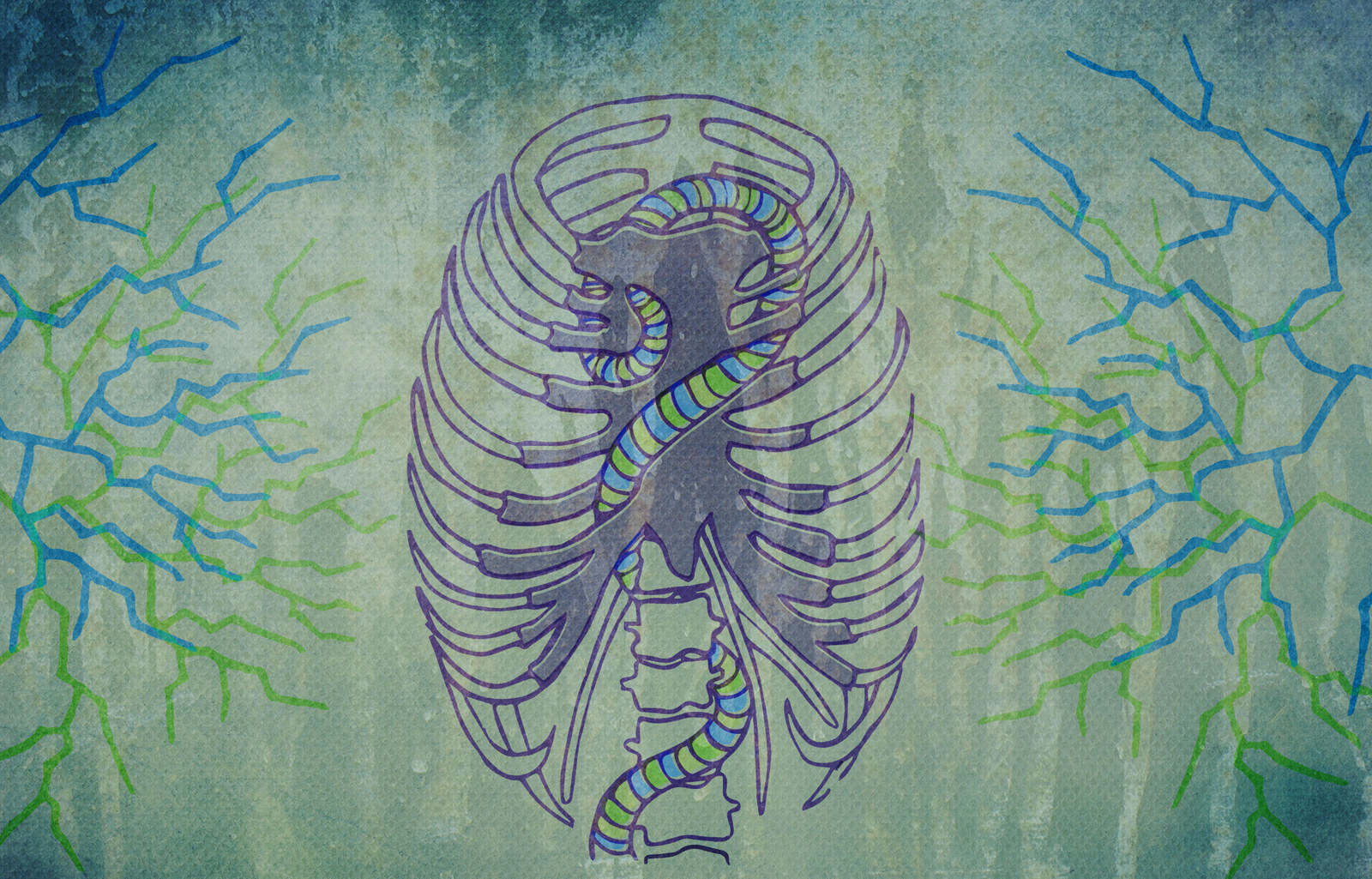
"I still tell my friends I am in recovery so they will hold me accountable."
10. What Comedy Taught Me About My Mental Illness — Kate Lindstedt

"I didn’t expect it, but stand-up comedy has given me the freedom to talk about depression and anxiety on my own terms."
11. The Night I Spoke Up About My #BlackSuicide — Terrell J. Starr
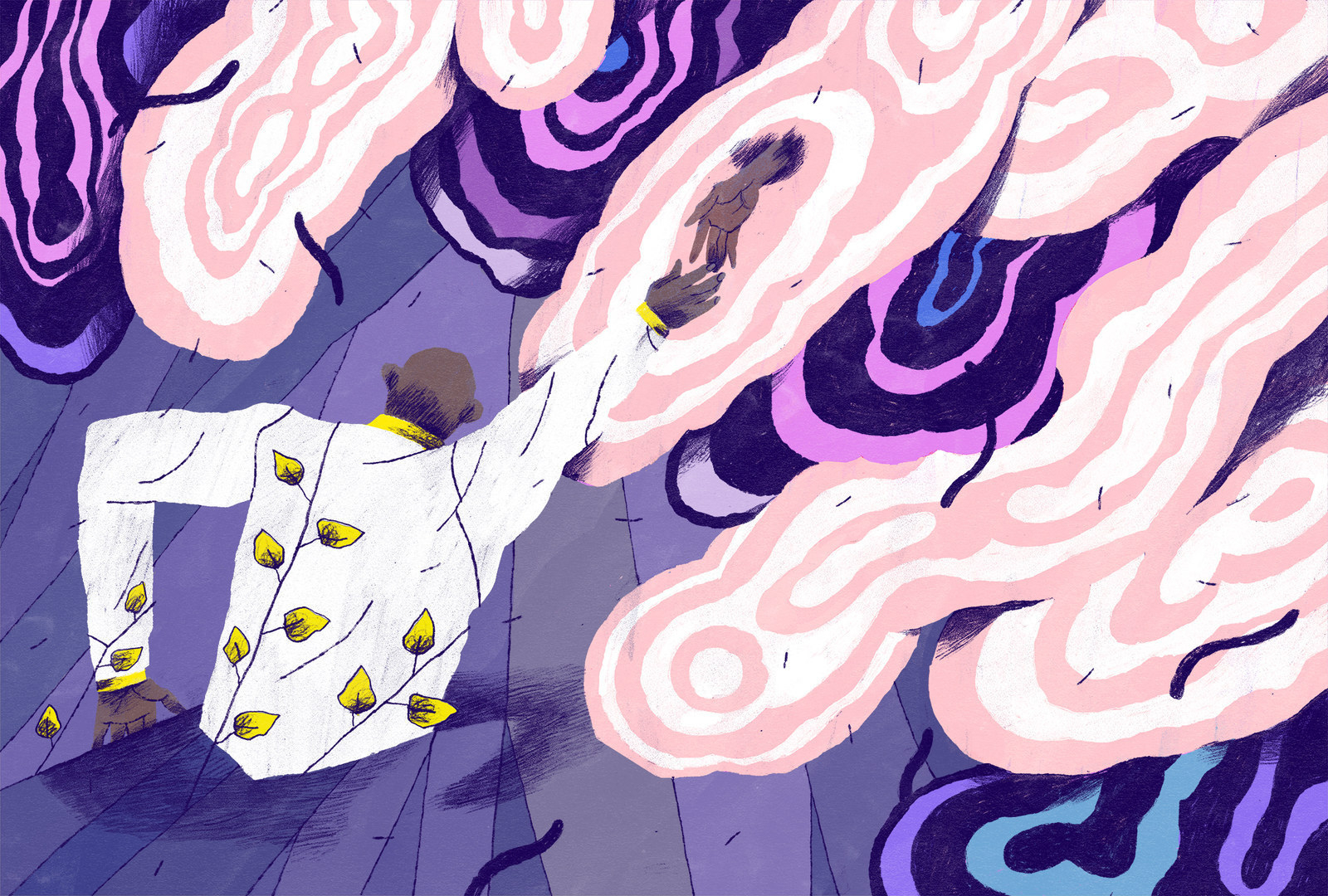
"My entire life was shaped by violence, so I wanted to end it violently. But I didn’t — thanks to overcoming the stigma surrounding African-Americans and depression, and to building a community on Twitter."
12. Knitting Myself Back Together — Alanna Okun

"The best way I’ve found to fight my anxiety is with a pair of knitting needles."
13. I Started Therapy So I Could Take Better Care Of Myself — Matt Ortile
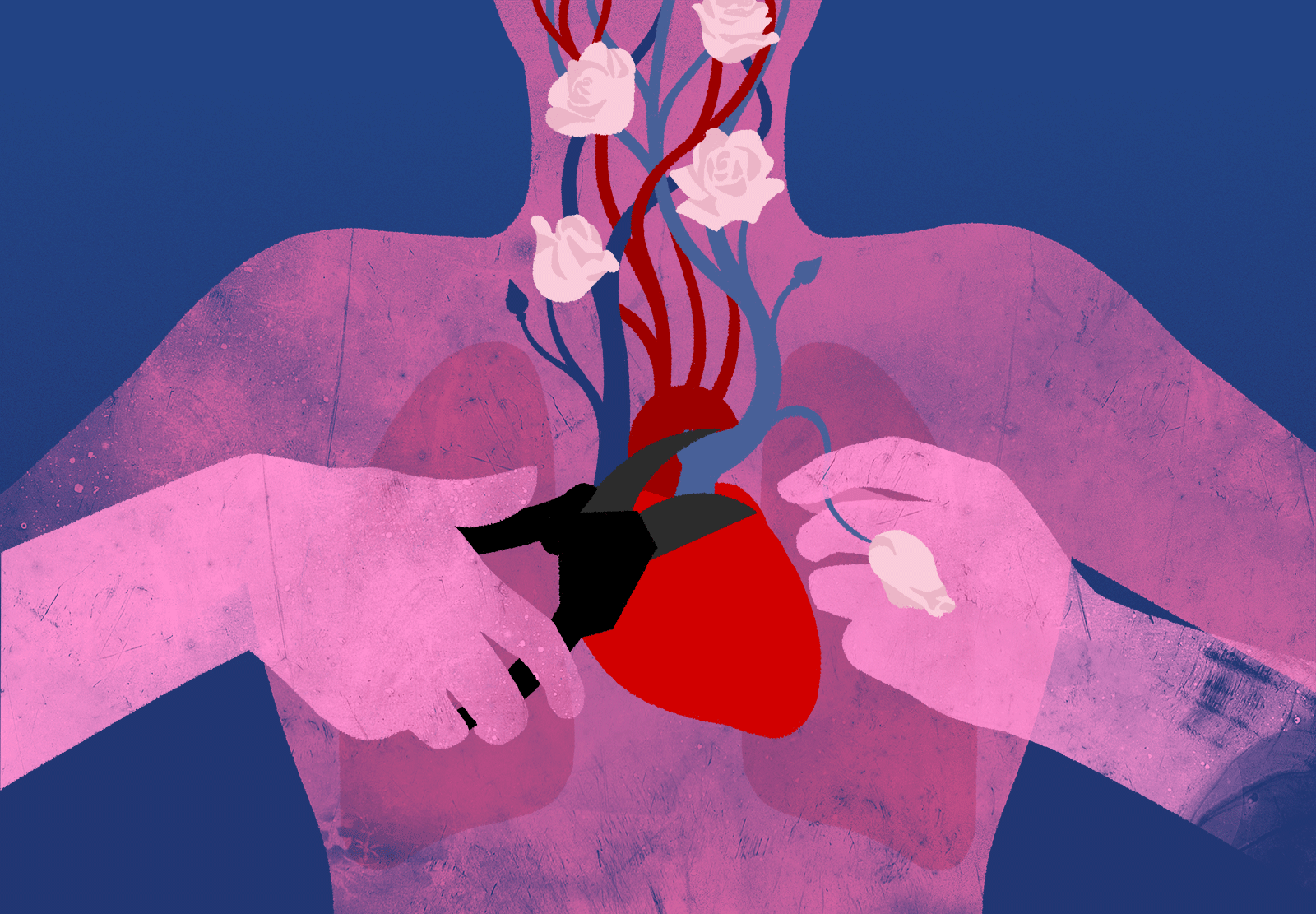
"I’d known for a while that I needed to see a therapist. It wasn’t until I felt like I could do without help that I finally sought it."
14. I’m Mending My Broken Relationship With Food — Anita Badejo
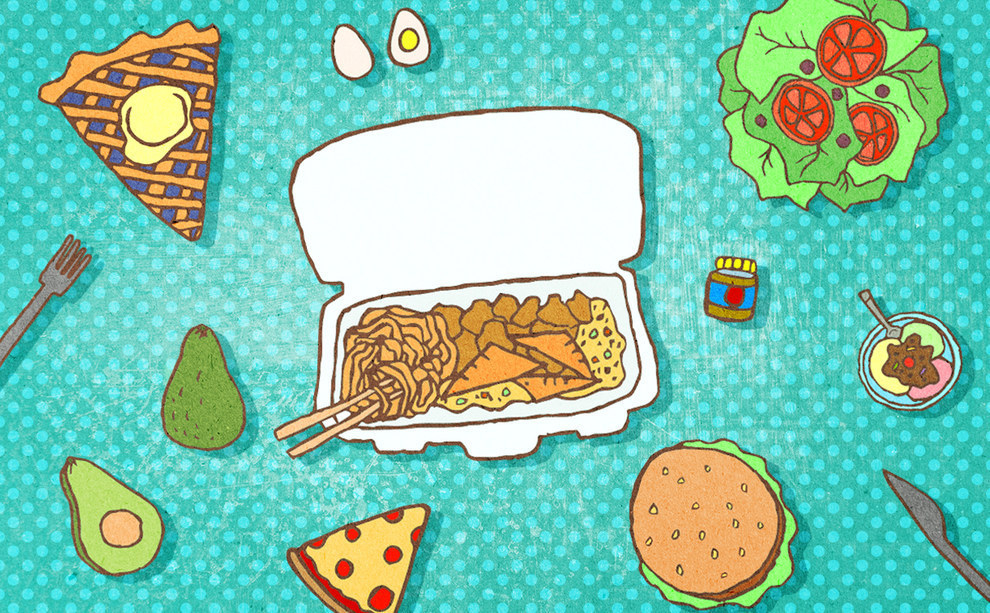
"After a lifetime struggling with disordered eating, I’m still figuring out how to have a healthy relationship with my body and what I feed it."
15. I Found Love In A Hopeless Mess — Kate Conger
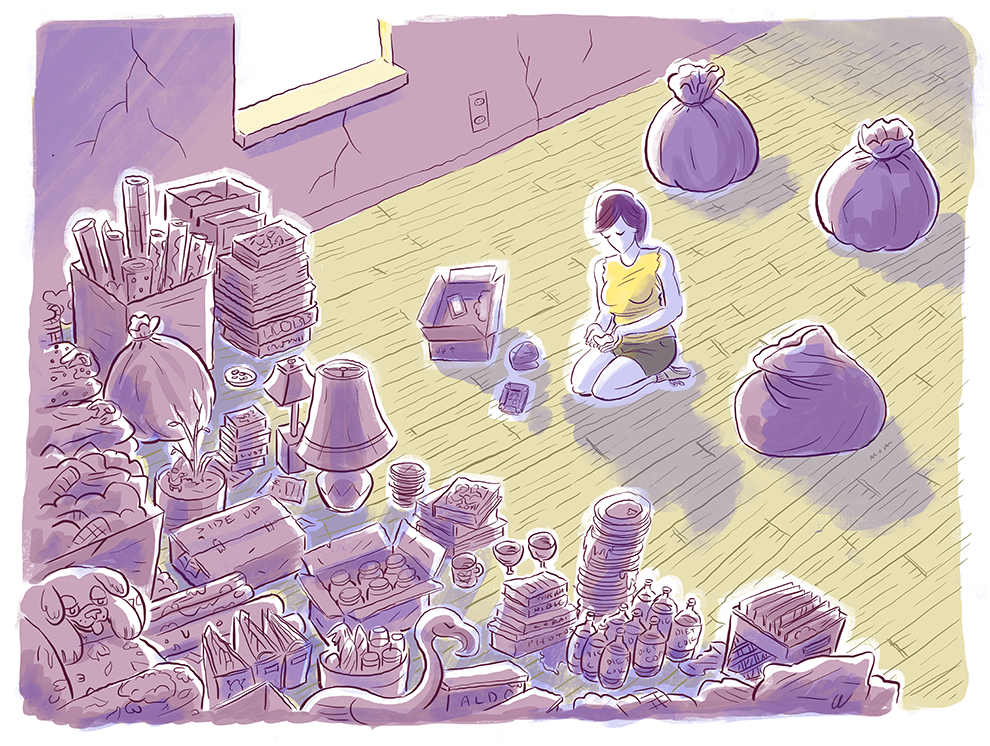
"Dehoarding my partner’s childhood home gave me a way to understand his mother, but I’m still not sure how to live with the habit he’s inherited."
16. When Taking Anxiety Medication Is A Revolutionary Act — Tracy Clayton

"I had to learn how to love myself enough to take care of myself. It wasn’t easy."
Topics in this article
- Mental Health
- Bipolar Disorder
- Therapy Center
- When To See a Therapist
- Types of Therapy
- Best Online Therapy
- Best Couples Therapy
- Managing Stress
- Sleep and Dreaming
- Understanding Emotions
- Self-Improvement
- Healthy Relationships
- Student Resources
- Personality Types
- Sweepstakes
- Guided Meditations
- Verywell Mind Insights
- 2024 Verywell Mind 25
- Mental Health in the Classroom
- Editorial Process
- Meet Our Review Board
- Crisis Support
The Importance of Mental Health
It's not just a buzzword
Westend61 / Getty Images
Risk Factors for Poor Mental Health
Signs of mental health problems, benefits of good mental health, how to maintain mental health and well-being.
Your mental health is an important part of your well-being. This aspect of your welfare determines how you’re able to operate psychologically, emotionally, and socially among others.
Considering how much of a role your mental health plays in each aspect of your life, it's important to guard and improve psychological wellness using appropriate measures.
Because different circumstances can affect your mental health, we’ll be highlighting risk factors and signs that may indicate mental distress. But most importantly, we’ll dive into why mental health is so important.
Mental health is described as a state of well-being where a person is able to cope with the normal stresses of life. This state permits productive work output and allows for meaningful contributions to society.
However, different circumstances exist that may affect the ability to handle life’s curveballs. These factors may also disrupt daily activities, and the capacity to manage these changes. That's only one reason why mental health is so important.
The following factors, listed below, may affect mental well-being and could increase the risk of developing psychological disorders .
Childhood Abuse
Childhood physical assault, sexual violence, emotional abuse, or neglect can lead to severe mental and emotional distress. Abuse increases the risk of developing mental disorders like depression, anxiety, post-traumatic stress disorder, or personality disorders.
Children who have been abused may eventually deal with alcohol and substance use issues. But beyond mental health challenges, child abuse may also lead to medical complications such as diabetes, stroke, and other forms of heart disease.
The Environment
A strong contributor to mental well-being is the state of a person’s usual environment . Adverse environmental circumstances can cause negative effects on psychological wellness.
For instance, weather conditions may influence an increase in suicide cases. Likewise, experiencing natural disasters firsthand can increase the chances of developing PTSD. In certain cases, air pollution may produce negative effects on depression symptoms.
In contrast, living in a positive social environment can provide protection against mental challenges.
Your biological makeup could determine the state of your well-being. A number of mental health disorders have been found to run in families and may be passed down to members.
These include conditions such as autism , attention deficit hyperactivity disorder , bipolar disorder , depression , and schizophrenia .
Your lifestyle can also impact your mental health. Smoking, a poor diet , alcohol consumption , substance use , and risky sexual behavior may cause psychological harm. These behaviors have been linked to depression.
When mental health is compromised, it isn’t always apparent to the individual or those around them. However, there are certain warning signs to look out for, that may signify negative changes for the well-being. These include:
- A switch in eating habits, whether over or undereating
- A noticeable reduction in energy levels
- Being more reclusive and shying away from others
- Feeling persistent despair
- Indulging in alcohol, tobacco, or other substances more than usual
- Experiencing unexplained confusion, anger, guilt, or worry
- Severe mood swings
- Picking fights with family and friends
- Hearing voices with no identifiable source
- Thinking of self-harm or causing harm to others
- Being unable to perform daily tasks with ease
Whether young or old, the importance of mental health for total well-being cannot be overstated. When psychological wellness is affected, it can cause negative behaviors that may not only affect personal health but can also compromise relationships with others.
Below are some of the benefits of good mental health.
A Stronger Ability to Cope With Life’s Stressors
When mental and emotional states are at peak levels, the challenges of life can be easier to overcome.
Where alcohol/drugs, isolation, tantrums, or fighting may have been adopted to manage relationship disputes, financial woes, work challenges, and other life issues—a stable mental state can encourage healthier coping mechanisms.
A Positive Self-Image
Mental health greatly correlates with personal feelings about oneself. Overall mental wellness plays a part in your self-esteem . Confidence can often be a good indicator of a healthy mental state.
A person whose mental health is flourishing is more likely to focus on the good in themselves. They will hone in on these qualities, and will generally have ambitions that strive for a healthy, happy life.
Healthier Relationships
If your mental health is in good standing, you might be more capable of providing your friends and family with quality time , affection , and support. When you're not in emotional distress, it can be easier to show up and support the people you care about.
Better Productivity
Dealing with depression or other mental health disorders can impact your productivity levels. If you feel mentally strong , it's more likely that you will be able to work more efficiently and provide higher quality work.
Higher Quality of Life
When mental well-being thrives, your quality of life may improve. This can give room for greater participation in community building. For example, you may begin volunteering in soup kitchens, at food drives, shelters, etc.
You might also pick up new hobbies , and make new acquaintances , and travel to new cities.
Because mental health is so important to general wellness, it’s important that you take care of your mental health.
To keep mental health in shape, a few introductions to and changes to lifestyle practices may be required. These include:
- Taking up regular exercise
- Prioritizing rest and sleep on a daily basis
- Trying meditation
- Learning coping skills for life challenges
- Keeping in touch with loved ones
- Maintaining a positive outlook on life
Another proven way to improve and maintain mental well-being is through the guidance of a professional. Talk therapy can teach you healthier ways to interact with others and coping mechanisms to try during difficult times.
Therapy can also help you address some of your own negative behaviors and provide you with the tools to make some changes in your own life.
The Bottom Line
So why is mental health so important? That's an easy answer: It profoundly affects every area of your life. If you're finding it difficult to address mental health concerns on your own, don't hesitate to seek help from a licensed therapist .
World Health Organization. Mental Health: Strengthening our Response .
Lippard ETC, Nemeroff CB. The Devastating Clinical Consequences of Child Abuse and Neglect: Increased Disease Vulnerability and Poor Treatment Response in Mood Disorders . Am J Psychiatry . 2020;177(1):20-36. doi:10.1176/appi.ajp.2019.19010020
Helbich M. Mental Health and Environmental Exposures: An Editorial. Int J Environ Res Public Health . 2018;15(10):2207. Published 2018 Oct 10. doi:10.3390/ijerph15102207
Helbich M. Mental Health and Environmental Exposures: An Editorial. Int J Environ Res Public Health . 2018;15(10):2207. Published 2018 Oct 10. doi:10.3390/ijerph15102207
National Institutes of Health. Common Genetic Factors Found in 5 Mental Disorders .
Zaman R, Hankir A, Jemni M. Lifestyle Factors and Mental Health . Psychiatr Danub . 2019;31(Suppl 3):217-220.
Medline Plus. What Is mental health? .
National Alliance on Mental Health. Why Self-Esteem Is Important for Mental Health .
By Elizabeth Plumptre Elizabeth is a freelance health and wellness writer. She helps brands craft factual, yet relatable content that resonates with diverse audiences.
Fact sheets
- Facts in pictures
Publications
- Questions and answers
- Tools and toolkits
- Endometriosis
- Excessive heat
- Mental disorders
- Polycystic ovary syndrome
- All countries
- Eastern Mediterranean
- South-East Asia
- Western Pacific
- Data by country
- Country presence
- Country strengthening
- Country cooperation strategies
- News releases
- Feature stories
- Press conferences
- Commentaries
- Photo library
- Afghanistan
- Cholera
- Coronavirus disease (COVID-19)
- Greater Horn of Africa
- Israel and occupied Palestinian territory
- Disease Outbreak News
- Situation reports
- Weekly Epidemiological Record
- Surveillance
- Health emergency appeal
- International Health Regulations
- Independent Oversight and Advisory Committee
- Classifications
- Data collections
- Global Health Observatory
- Global Health Estimates
- Mortality Database
- Sustainable Development Goals
- Health Inequality Monitor
- Global Progress
- World Health Statistics
- Partnerships
- Committees and advisory groups
- Collaborating centres
- Technical teams
- Organizational structure
- Initiatives
- General Programme of Work
- WHO Academy
- Investment in WHO
- WHO Foundation
- External audit
- Financial statements
- Internal audit and investigations
- Programme Budget
- Results reports
- Governing bodies
- World Health Assembly
- Executive Board
- Member States Portal
- Fact sheets /
Mental health
- Affordable, effective and feasible strategies exist to promote, protect and restore mental health.
- The need for action on mental health is indisputable and urgent.
- Mental health has intrinsic and instrumental value and is integral to our well-being.
- Mental health is determined by a complex interplay of individual, social and structural stresses and vulnerabilities.
Concepts in mental health
Mental health is a state of mental well-being that enables people to cope with the stresses of life, realize their abilities, learn well and work well, and contribute to their community. It is an integral component of health and well-being that underpins our individual and collective abilities to make decisions, build relationships and shape the world we live in. Mental health is a basic human right. And it is crucial to personal, community and socio-economic development.
Mental health is more than the absence of mental disorders. It exists on a complex continuum, which is experienced differently from one person to the next, with varying degrees of difficulty and distress and potentially very different social and clinical outcomes.
Mental health conditions include mental disorders and psychosocial disabilities as well as other mental states associated with significant distress, impairment in functioning, or risk of self-harm. People with mental health conditions are more likely to experience lower levels of mental well-being, but this is not always or necessarily the case.
Determinants of mental health
Throughout our lives, multiple individual, social and structural determinants may combine to protect or undermine our mental health and shift our position on the mental health continuum.
Individual psychological and biological factors such as emotional skills, substance use and genetics can make people more vulnerable to mental health problems.
Exposure to unfavourable social, economic, geopolitical and environmental circumstances – including poverty, violence, inequality and environmental deprivation – also increases people’s risk of experiencing mental health conditions.
Risks can manifest themselves at all stages of life, but those that occur during developmentally sensitive periods, especially early childhood, are particularly detrimental. For example, harsh parenting and physical punishment is known to undermine child health and bullying is a leading risk factor for mental health conditions.
Protective factors similarly occur throughout our lives and serve to strengthen resilience. They include our individual social and emotional skills and attributes as well as positive social interactions, quality education, decent work, safe neighbourhoods and community cohesion, among others.
Mental health risks and protective factors can be found in society at different scales. Local threats heighten risk for individuals, families and communities. Global threats heighten risk for whole populations and include economic downturns, disease outbreaks, humanitarian emergencies and forced displacement and the growing climate crisis.
Each single risk and protective factor has only limited predictive strength. Most people do not develop a mental health condition despite exposure to a risk factor and many people with no known risk factor still develop a mental health condition. Nonetheless, the interacting determinants of mental health serve to enhance or undermine mental health.
Mental health promotion and prevention
Promotion and prevention interventions work by identifying the individual, social and structural determinants of mental health, and then intervening to reduce risks, build resilience and establish supportive environments for mental health. Interventions can be designed for individuals, specific groups or whole populations.
Reshaping the determinants of mental health often requires action beyond the health sector and so promotion and prevention programmes should involve the education, labour, justice, transport, environment, housing, and welfare sectors. The health sector can contribute significantly by embedding promotion and prevention efforts within health services; and by advocating, initiating and, where appropriate, facilitating multisectoral collaboration and coordination.
Suicide prevention is a global priority and included in the Sustainable Development Goals. Much progress can be achieved by limiting access to means, responsible media reporting, social and emotional learning for adolescents and early intervention. Banning highly hazardous pesticides is a particularly inexpensive and cost–effective intervention for reducing suicide rates.
Promoting child and adolescent mental health is another priority and can be achieved by policies and laws that promote and protect mental health, supporting caregivers to provide nurturing care, implementing school-based programmes and improving the quality of community and online environments. School-based social and emotional learning programmes are among the most effective promotion strategies for countries at all income levels.
Promoting and protecting mental health at work is a growing area of interest and can be supported through legislation and regulation, organizational strategies, manager training and interventions for workers.
Mental health care and treatment
In the context of national efforts to strengthen mental health, it is vital to not only protect and promote the mental well-being of all, but also to address the needs of people with mental health conditions.
This should be done through community-based mental health care, which is more accessible and acceptable than institutional care, helps prevent human rights violations and delivers better recovery outcomes for people with mental health conditions. Community-based mental health care should be provided through a network of interrelated services that comprise:
- mental health services that are integrated in general health care, typically in general hospitals and through task-sharing with non-specialist care providers in primary health care;
- community mental health services that may involve community mental health centers and teams, psychosocial rehabilitation, peer support services and supported living services; and
- services that deliver mental health care in social services and non-health settings, such as child protection, school health services, and prisons.
The vast care gap for common mental health conditions such as depression and anxiety means countries must also find innovative ways to diversify and scale up care for these conditions, for example through non-specialist psychological counselling or digital self-help.
WHO response
All WHO Member States are committed to implementing the “Comprehensive mental health action plan 2013–2030" , which aims to improve mental health by strengthening effective leadership and governance, providing comprehensive, integrated and responsive community-based care, implementing promotion and prevention strategies, and strengthening information systems, evidence and research. In 2020, WHO’s “Mental health atlas 2020” analysis of country performance against the action plan showed insufficient advances against the targets of the agreed action plan.
WHO’s “World mental health report: transforming mental health for all” calls on all countries to accelerate implementation of the action plan. It argues that all countries can achieve meaningful progress towards better mental health for their populations by focusing on three “paths to transformation”:
- deepen the value given to mental health by individuals, communities and governments; and matching that value with commitment, engagement and investment by all stakeholders, across all sectors;
- reshape the physical, social and economic characteristics of environments – in homes, schools, workplaces and the wider community – to better protect mental health and prevent mental health conditions; and
- strengthen mental health care so that the full spectrum of mental health needs is met through a community-based network of accessible, affordable and quality services and supports.
WHO gives particular emphasis to protecting and promoting human rights, empowering people with lived experience and ensuring a multisectoral and multistakeholder approach.
WHO continues to work nationally and internationally – including in humanitarian settings – to provide governments and partners with the strategic leadership, evidence, tools and technical support to strengthen a collective response to mental health and enable a transformation towards better mental health for all.
- World mental health report: transforming mental health for all
- Comprehensive Mental Health Action Plan 2013─2030
- Mental health atlas 2020
More about mental health
- WHO's work on mental health
- Read more about mental health
- World Mental Health Day
Writing Can Help Us Heal from Trauma
by Deborah Siegel-Acevedo

Summary .
Why does a writing intervention work? While it may seem counterintuitive that writing about negative experiences has a positive effect, some have posited that narrating the story of a past negative event or an ongoing anxiety “frees up” cognitive resources. Research suggests that trauma damages brain tissue, but that when people translate their emotional experience into words, they may be changing the way it is organized in the brain. This matters, both personally and professionally. In a moment still permeated with epic stress and loss, we need to call in all possible supports. So, what does this look like in practice, and how can you put this powerful tool into effect? The author offers three practices, with prompts, to get you started.
Even as we inoculate our bodies and seemingly move out of the pandemic, psychologically we are still moving through it. We owe it to ourselves — and our coworkers — to make space for processing this individual and collective trauma. A recent op-ed in the New York Times Sunday Review affirms what I, as a writer and professor of writing, have witnessed repeatedly, up close: expressive writing can heal us.
Partner Center
The .gov means it’s official. Federal government websites often end in .gov or .mil. Before sharing sensitive information, make sure you're on a federal government site.
The site is secure. The https:// ensures that you are connecting to the official website and that any information you provide is encrypted and transmitted securely.

Trusted Health Information from the National Institutes of Health
Teens are talking about mental health
High schoolers' stories give a glimpse into the national crisis.

Adolescence can be a complicated time, especially for mental health, and some teens want their communities to do more in response.
The prevalence of mental health issues is hard to measure, but federal data show how widespread the challenges are. The Centers for Disease Control and Prevention (CDC) said we need to address threats to mental health in young people—especially adolescents.
More than one third (37%) of high schoolers in the United States reported experiencing poor mental health during the COVID-19 pandemic, according to a 2021 CDC study . Almost half (44%) of high schoolers reported feeling persistently sad or hopeless in the last year. Some of these feelings were also linked to experiences of racism, social stigma around gender and sexual identity, and sexual violence.
"I was also having issues with my friendships at school and an increased level of stress when it came time for tests, projects, and other assessments…the feeling of isolation, lack of appetite, and absolute hatred of school were not normal." –Morgan, New Jersey
Studies like these can help shed light on issues that teens may be hesitant or unable to discuss with parents, doctors , and school staff.
Stigma and a lack of information or access to care also keep many teens from getting help. But sharing personal stories about mental health can offer encouragement and connection. This can help teens feel like they are not alone. That’s why NIH asked high schoolers to describe these challenges in their own words for the 2022 Speaking Up About Mental Health! essay contest.
The contest was sponsored by the National Institute of Mental Health (NIMH), the National Institute on Minority Health and Health Disparities (NIMHD), and the Eunice Kennedy Shriver National Institute of Child Health and Human Development (NICHD). They wanted to start conversations around youth mental health and highlight different aspects of this national health crisis.
In their essays, many students talked about feeling lost, embarrassed, or frustrated by their mental health struggles. Others wrote about going from being confident in early childhood to feeling alone or unseen in adolescence.
NIH-funded researcher Tamar Mendelson, M.A., Ph.D., Bloomberg Professor of American Health and Director for the Center for Adolescent Health at the Johns Hopkins Bloomberg School of Public Health, says that’s not surprising. Depression rates tend to increase around puberty, especially among girls but also in boys. Dr. Mendelson said this can be caused by a combination of hormonal changes, new social relationships, and new pressures from academic, athletic, and other activities.
"For many Asian American youths, getting help for mental health can be hindered by stereotypes. Asian American boys, in particular, may not seek therapy since their cultures expect them to be more resilient than girls. After all, as the older brother, how can I let my little sister know when I am not feeling well emotionally?" –Evan, Texas
“Young people who are feeling overwhelmed or are not sure how to cope with emotions may be more likely to use substances to kind of help with that,” Dr. Mendelson said. Such substances could include alcohol, tobacco, or prescription or illicit drugs, for example.
Puberty is also when many young people become more aware of their sexual orientations and gender identities. For some, this can lead to being unaccepted or bullied. Rates of substance use and misuse also tend to increase during puberty.
In addition to navigating the typical stressors that teens face, more recently they also had to cope with the COVID-19 pandemic and related family losses or financial struggles. They’ve experienced or witnessed racial- and identity-based discrimination, gun violence, political unrest, natural disasters, and climate change. These challenges coupled with other risk factors, including some parenting styles, can lead to mental health issues such as anxiety and depression.
Even though environmental triggers have changed over time, adolescent anxiety was rising even before the pandemic.
Michele Ybarra, Ph.D., an adjunct professor of mental health at the Johns Hopkins Bloomberg School of Public Health and also an NIH-supported researcher, said that not long ago, it was widely believed that youth could not have depression because people thought, “What do [they] have to be depressed about?”
"Schools are places where students should feel safe and comfortable enough to ask for help. By using simple technology and dedicating time toward impactful mental health screening, schools can truly serve students and assist them in living happier, healthier lives." –Huda, North Carolina
But in the last several decades, Dr. Ybarra said, mental health professionals have realized that depression can happen to anyone at any age.
Several students wrote about schools with limited, outdated, or no education on the topic. Some said they could not speak to a therapist or school counselor when they needed to.
The issue is worse for students in rural areas , in schools with limited financial resources, or who need culturally appropriate care such as bilingual mental health information.
But digital tools can connect youth to information about their mental health. For example, Dr. Ybarra said, the rise of telehealth and teletherapy since the pandemic has helped increase access for some.
Dr. Ybarra said that while technology (including social media) can have both positive and negative effects on mental health, it can also be a force for good. The nature of relationships has changed in the internet age, and connecting online is natural for adolescents . Options like crisis lines or online therapy can get help to teens quickly.
Multiple students said when they could not find resources from their schools or communities, they started their own. Some also said their experiences have inspired them to study mental health and treatments after high school.
One student said they began volunteering for a teen crisis hotline after their cousin used the same service for help. The student also joined a youth advisory group for their state governor’s office and offered help as a peer-to-peer counselor at their school.
“My passion towards becoming a researcher on psychiatric disorders is stronger than ever,” they wrote.
The way people talk about mental illness could also be better, one student wrote . They preferred the phrase “living” with a mental illness rather than “suffering” from one. This small change in language signals it’s possible for people with such conditions to live happy and fulfilling lives. This student also said their own school began marking mental health-related absences as excused and holding an annual mental health week to encourage open conversation.
It’s too early to tell what the long-term effects of the past few years will have on youth mental health. But Dr. Ybarra said some teens have become more resilient since the pandemic began.
“I don’t think this generation is doomed in any way,” she said. “Several kids have said [the pandemic] really gave them the time to better understand themselves, they better understand their sexuality … Other kids took on new hobbies, and they learned how to do new things. Maybe they gave themselves permission to not talk to that toxic person in their lives.” While there’s no denying the pandemic has been a stressful experience, Dr. Ybarra’s impression is that most teens have come out the other side with perspective and an ability to thrive.
“This is good news. It also means that we need to be diligent about identifying teens who continue to struggle and connect them to services,” she said.
If you think a teen is experiencing a mental health crisis, the 988 Suicide and Crisis Lifeline is a national, 24/7 hotline that can connect you with a trained crisis counselor by phone or online chat. Call or text 988 to connect to a trained crisis counselor 24/7 or use the live online chat option. TTY users can contact the Lifeline via their preferred relay service or by dialing 711, then 988.
By the numbers
According to the centers for disease control and prevention, in 2021:.
- Asian (non-Hispanic): 64%
- Black (non-Hispanic): 55%
- Multiracial (non-Hispanic): 55%
- Hispanic or Latino: 42%
- American Indian/Alaska Native (non-Hispanic): 27%
- Native Hawaiian/Pacific Islander (non-Hispanic): 55%
- White (non-Hispanic): 23%
- 18% of female high schoolers and 5% of male high schoolers experienced sexual violence, up from 15% and 4%, respectively, in 2017
- Up from 41% and 21%, respectively, in 2017
- 14% of LGBQ+ high schoolers and 7% of heterosexual students did not go to school because of safety concerns
*Data set did not account for gender identity, although previous research has shown that transgender youth experience more stigma and are more likely to have more suicidal thoughts or behaviors compared to their peers.
NIH-supported research on adolescent mental health
Greater engagement in gender-sexuality alliances (gsas) and gsa characteristics predict youth empowerment and reduced mental health concerns.
This study, supported by NIMHD, focused on the connections between sexual and gender minority youth’s involvement in extracurricular activities and their mental health. Researchers focused on gender-sexuality alliances (also sometimes called gay-straight alliances), which are school-based clubs to bring young people together to discuss shared issues or interests. Learn more about this study .
Understanding Bystanders for Self-Directed Violence Prevention: A Prospective National Study Highlighting Marginalized Youth and Young Adults
Self-directed violence refers to anything a person does intentionally that can cause injury or death to themselves. This study will examine the effectiveness of programs that train youth to be “active bystanders” and help those in danger of self-directed violence. Researchers will survey approximately 5,000 participants ages 13 to 22, recruited via social media, about the impacts of these bystander training programs in real-world situations. Read more about this study .
Strategic Framework for Addressing Youth Mental Health Disparities
This plan outlines research studies and other activities by NIMH, NICHD, and NIMHD to reduce mental health disparities among underserved and underrepresented youth by 2031. Some of the plan’s goals are to develop culturally appropriate mental health interventions for youth and parents and to research co-occurring mental illness among young people in groups that have been marginalized. Read more about the framework .
Alternative accessible version (pdf)
Centers for Disease Control and Prevention ; Morbidity and Mortality Weekly Report Supplement, Vol. 71, No. 3 ; CDC report shows concerning increases in sadness and exposure to violence among teen girls and LGBQ+ youth ; LGBQ+ Teens
May 16, 2023
You May Also Like

Teens and stress: When it’s more than worry
Stress—and sometimes feeling anxious—is a natural and normal experience for everyone, including children and teenagers. But when those feelings last...

Children and the pandemic: NIH explores mental health impact on American youth
COVID-19 has likely had some mental health impact on most of us, especially children and adolescents. The National Institutes of...

To help an anxious child, start with their parents
The best way to help children with an anxiety disorder may be to help their parents first, a new NIH-funded...
Trusted health information delivered to your inbox
Enter your email below
Home — Essay Samples — Nursing & Health — Mental Health — The Importance of Mental Health Awareness
The Importance of Mental Health Awareness
- Categories: Mental Health Social Isolation Stress Management
About this sample

Words: 1622 |
Updated: 4 November, 2023
Words: 1622 | Pages: 4 | 9 min read
Table of contents
Introduction, mental health awareness, video version, emotional well-being, psychological well‐being, social well-being.
- Health Effects of Social Isolation and Loneliness. (n.d.). Retrieved from https://www.aginglifecarejournal.org/health-effects-of-social-isolation-and-loneliness/.
- Top of Form Mental Health Myths and Facts https://www.mentalhealth.gov/basics/mental-health-myths-facts
- Mental Health Care Services by Family Physicians Position Paper. American Academy of Family Physicians Web site. http://www.aafp.org/online/en/home/policy/policies/m/mentalhealthcareservices.htm. Accessed February 11, 2013. [Google Scholar]
- Newman, T. (2017, August 24). Mental health: Definition , common disorders, and early signs. Retrieved from https://www.medicalnewstoday.com/articles/154543.php.
- Bottom of Form Rodriguez, B. D., Hurley, K., Upham, B., Kilroy, D. S., Dark, N., & Abreu, E (n.d.).Happiness and Emotional Well-Being. Retrieved from https://www.everydayhealth.com/emotional-health/understanding/index.aspx.
- World Health Organization. The Global Burden of Disease, 2004 Update. Part 4, Burden of Disease, DALYs. http://www.who.int/healthinfo/global_burden_disease/GBD_report_2004update_full.pdf . Accessed January 10, 2013. [Google Scholar]

Cite this Essay
To export a reference to this article please select a referencing style below:
Let us write you an essay from scratch
- 450+ experts on 30 subjects ready to help
- Custom essay delivered in as few as 3 hours
Get high-quality help

Dr Jacklynne
Verified writer
- Expert in: Nursing & Health

+ 120 experts online
By clicking “Check Writers’ Offers”, you agree to our terms of service and privacy policy . We’ll occasionally send you promo and account related email
No need to pay just yet!
Related Essays
2 pages / 973 words
3 pages / 1355 words
6 pages / 2646 words
6 pages / 2791 words
Remember! This is just a sample.
You can get your custom paper by one of our expert writers.
121 writers online
Still can’t find what you need?
Browse our vast selection of original essay samples, each expertly formatted and styled
Related Essays on Mental Health
Mental health is a critical aspect of overall well-being, and its importance in the school setting cannot be overstated. In recent years, the prevalence of mental health issues among students has increased significantly, leading [...]
Social media has become an integral part of modern life, providing platforms for communication, connection, and self-expression. However, the implications of heavy social media use on mental health have raised concerns. In this [...]
Al-Rousan et al., 2017Baba et al., 2017da Rosa et al., 2019Davidson et al., 2020Esnafoglu & Ozturan, 2020Gangadharan & Madani, 2018Greene et al., 2018Kilbourne et al., 2018
In today's fast-paced and interconnected world, the concept of self-love has become increasingly important. With the rise of social media and constant exposure to curated images of perfection, many individuals find themselves [...]
Personality refers to individual differences in characteristic patterns of thinking, feeling and behaving. The study of personality focuses on two broad areas: One is understanding individual differences in particular [...]
The fulfillment that goes with that the fruitful completion of any errand would be inadequate without the specify of individuals whose organization made it conceivable, whose steady direction and support crown all endeavors with [...]
Related Topics
By clicking “Send”, you agree to our Terms of service and Privacy statement . We will occasionally send you account related emails.
Where do you want us to send this sample?
By clicking “Continue”, you agree to our terms of service and privacy policy.
Be careful. This essay is not unique
This essay was donated by a student and is likely to have been used and submitted before
Download this Sample
Free samples may contain mistakes and not unique parts
Sorry, we could not paraphrase this essay. Our professional writers can rewrite it and get you a unique paper.
Please check your inbox.
We can write you a custom essay that will follow your exact instructions and meet the deadlines. Let's fix your grades together!
Get Your Personalized Essay in 3 Hours or Less!
We use cookies to personalyze your web-site experience. By continuing we’ll assume you board with our cookie policy .
- Instructions Followed To The Letter
- Deadlines Met At Every Stage
- Unique And Plagiarism Free
Mental Health Counseling Admission Essay
- To find inspiration for your paper and overcome writer’s block
- As a source of information (ensure proper referencing)
- As a template for you assignment
A college essay on mental health is a type of writing that requires your preparation. For this purpose, you can check out some examples. Below, we’ve prepared “Why I Want to Be a Mental Health Counselor Essay,” which will help you get inspired and write a successful application to your preferred educational institution.
Mental health counseling is a diverse profession with national standards for education, preparation, and clinical practice. The profession offers help to the ever-increasing number of Americans requiring mental therapy.
Clinical mental health practitioners are highly skilled professionals who provide flexible, consumer-oriented therapy. Mental health counselors offer a variety of services, such as evaluation and diagnosis, psychotherapy, solution-focused therapy, crisis management, substance abuse treatment, and prevention programs.
After carefully researching and critically evaluating my career options, I have decided to pursue a Master’s degree in Clinical Counseling focusing on mental health counseling. This path will propel me toward becoming a mental health counselor. Not only am I an excellent listener with a desire to help the marginalized, but it is also evident that there is a growing need for clinical counselors in the country to safeguard against unemployment.
Furthermore, recent surveys indicate that clinical counselors receive competitive salary packages. Beyond the financial aspect, the mental health field is diverse and rapidly evolving. Much remains to be explored regarding brain function, and consequently, therapeutic methods in this field are not as advanced as in other medical fields. I plan to delve into this study area and uncover as much knowledge and information as possible throughout my career.
The decision to apply for the clinical counseling program in mental health was significantly influenced by an internship I completed at the Carter Center for Mental Health. Founded by Former First Lady Rosalynn Carter, the center aims to reduce the stigma associated with mental disorders in society. Despite increasing media coverage and information dissemination about mental health, myths and misconceptions still prevail in society.
At the Carter Center, I undertook a three-month volunteer internship to gain insight into working as a psychologist. However, after visiting numerous hospitals, outpatient mental health facilities, and hospices, I realized that my true calling might be in mental health counseling.
The internship was an eye-opening experience regarding the challenges faced by mental health patients, including those with depression, substance abuse issues, schizophrenia, eating disorders, personality disorders, and anxiety disorders. Witnessing the struggles of thousands of Americans with mental health disorders, I instinctively knew I had to contribute to the social welfare of this great country.
Cultural diversity and cultural prejudice are prevalent in our lives, and we must acknowledge and responsibly embrace them. Professionals have recently recognized the importance of addressing the challenges in serving culturally diverse populations. Cultural values, beliefs, and assumptions significantly influence mental health workers and other professionals’ service delivery.
These cultural experiences, traditions, beliefs, and assumptions shape our worldview. Thus, professionals should be conscious of their thoughts and strive to separate them from their work. Counselors and clients bring a range of values, attitudes, culturally influenced behaviors, biases, ideas, and assumptions to the therapeutic process. Some mental health professionals and counselors underestimate the significance of these factors in treatment.
I consider myself culturally enlightened, having grown up in a culturally diverse community in New York. This environment has taught me to embrace and appreciate cultural pluralism and diversity. Cultural diversity is an integral element that enriches society.
I have interacted with people from various cultures in school, stores, and my neighborhood, learning that humans are not as different as we sometimes think. We need to treat each other with respect and embrace each other’s beliefs, traditions, and cultural customs.
In addition to the internship, my drive for mental health counseling was subconsciously motivated by a teenage experience. Following the tragic death of my younger sister in a surfing accident, my mother fell into a state of depression. She frequently spoke of seeing my sister in her dreams. This placed a significant burden on my father to maintain family stability. Our relief came after my mother sought help from a post-trauma counselor.
She attended sessions with the counselor and, to our relief and joy, recovered within six months. She coped better with the loss of her daughter and realized that nothing could have been done to prevent the tragedy.
Reflecting on the counselor’s impact on my family, I appreciate this noble profession. I aspire to bring joy to families and individuals by helping them understand and cope with their mental health challenges.
Upon completing my Master’s degree in Clinical Counseling, I plan to practice for five to eight years in outpatient mental health facilities and other relevant settings to gain extensive experience in mental health counseling.
Additionally, I aim to join professional organizations such as the American Psychological Association and the American Mental Health Counselors Association, which require a Master’s degree in a related field and adherence to a strict code of ethics. Eventually, I plan to establish a private practice in New York, New Jersey, or California.
- Evaluation of Ideal Definitions and the Basis of Intelligence Testing
- Psychological Differences Between Immigrants
- Criminal Justice Internship Report
- Problems of Unpaid Internship
- Unpaid Internships and Labor Policies
- Effects of Word-colour and strategic manipulation in word recognition
- The Emergence of the New Psychology
- Psychological Testing Tools: Intelligence Tests
- “Existence, Relatedness, and Growth Model” by Clayton Alderfer
- Longitudinal Data Analysis
- Chicago (A-D)
- Chicago (N-B)
IvyPanda. (2019, May 5). Mental Health Counseling Admission Essay. https://ivypanda.com/essays/mental-health-counseling-essay/
"Mental Health Counseling Admission Essay." IvyPanda , 5 May 2019, ivypanda.com/essays/mental-health-counseling-essay/.
IvyPanda . (2019) 'Mental Health Counseling Admission Essay'. 5 May.
IvyPanda . 2019. "Mental Health Counseling Admission Essay." May 5, 2019. https://ivypanda.com/essays/mental-health-counseling-essay/.
1. IvyPanda . "Mental Health Counseling Admission Essay." May 5, 2019. https://ivypanda.com/essays/mental-health-counseling-essay/.
Bibliography
IvyPanda . "Mental Health Counseling Admission Essay." May 5, 2019. https://ivypanda.com/essays/mental-health-counseling-essay/.
IvyPanda uses cookies and similar technologies to enhance your experience, enabling functionalities such as:
- Basic site functions
- Ensuring secure, safe transactions
- Secure account login
- Remembering account, browser, and regional preferences
- Remembering privacy and security settings
- Analyzing site traffic and usage
- Personalized search, content, and recommendations
- Displaying relevant, targeted ads on and off IvyPanda
Please refer to IvyPanda's Cookies Policy and Privacy Policy for detailed information.
Certain technologies we use are essential for critical functions such as security and site integrity, account authentication, security and privacy preferences, internal site usage and maintenance data, and ensuring the site operates correctly for browsing and transactions.
Cookies and similar technologies are used to enhance your experience by:
- Remembering general and regional preferences
- Personalizing content, search, recommendations, and offers
Some functions, such as personalized recommendations, account preferences, or localization, may not work correctly without these technologies. For more details, please refer to IvyPanda's Cookies Policy .
To enable personalized advertising (such as interest-based ads), we may share your data with our marketing and advertising partners using cookies and other technologies. These partners may have their own information collected about you. Turning off the personalized advertising setting won't stop you from seeing IvyPanda ads, but it may make the ads you see less relevant or more repetitive.
Personalized advertising may be considered a "sale" or "sharing" of the information under California and other state privacy laws, and you may have the right to opt out. Turning off personalized advertising allows you to exercise your right to opt out. Learn more in IvyPanda's Cookies Policy and Privacy Policy .
Home / Essay Samples / Health / Mental Illness / The Importance of Mental Health: Prioritizing Well-being
The Importance of Mental Health: Prioritizing Well-being
- Category: Health
- Topic: Mental Illness , Stress
Pages: 2 (874 words)
- Downloads: -->
The Foundation of Well-Being
Building resilience, seeking support and treatment.
--> ⚠️ Remember: This essay was written and uploaded by an--> click here.
Found a great essay sample but want a unique one?
are ready to help you with your essay
You won’t be charged yet!
Diabetes Mellitus Essays
Hipaa Essays
Public Health Essays
Digestive System Essays
Cancer Essays
Related Essays
We are glad that you like it, but you cannot copy from our website. Just insert your email and this sample will be sent to you.
By clicking “Send”, you agree to our Terms of service and Privacy statement . We will occasionally send you account related emails.
Your essay sample has been sent.
In fact, there is a way to get an original essay! Turn to our writers and order a plagiarism-free paper.
samplius.com uses cookies to offer you the best service possible.By continuing we’ll assume you board with our cookie policy .--> -->